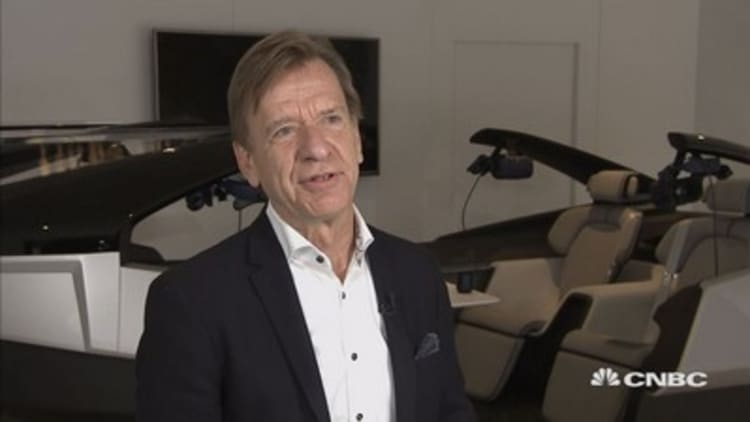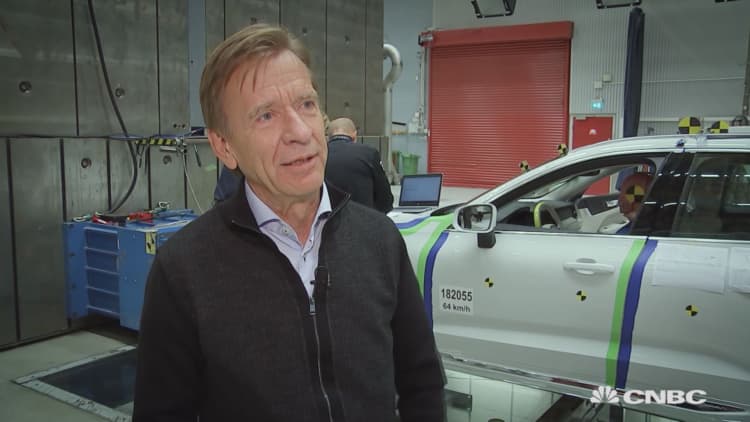What looked earlier this week like a resolution to the costly automotive tariff war with China has proven to be little more than a presidential boast.
The tit-for-tat trade war with China has been proving costly for the U.S. with signs that some automakers might be ready to move some production and jobs out of the country. That's why carmakers and car parts manufacturers on both sides of the Pacific were initially buoyed by the claim of an "incredible" trade deal emerging from the 2½ hour dinner meeting President Donald Trump held with his Chinese counterpart Xi Jinping on Saturday at the G-20 summit.

But the White House has now backpedaled, acknowledging there was no deal in place to roll back automotive tariffs. Trump himself on Tuesday tweeted there "probably will" be a trade deal to follow the dinner meeting, even as he declared himself "a Tariff Man." He might actually ramp up the trade dispute with the world's largest automotive market if there isn't a broader agreement within 90 days.
Hopes were buoyed when Trump told reporters in Argentina that he had reached an "incredible" deal with Xi, and followed by a tweet saying, "China has agreed to reduce and remove tariffs on cars coming into China from the U.S. Currently the tariff is 40%."
The Chinese tariff had been 25 percent and, earlier this year, the country was set to roll the tax back to just 15 percent. But when Trump announced broad new U.S. tariffs on Chinese made goods, the Beijing government raised duties specifically on American-made automobiles and parts.
The impact is actually less than that being felt in some other sectors of the U.S. economy, such as agriculture, but it is still a hit to the auto industry, which shipped about 250,000 vehicles to China last year. Vehicle sales were expected to grow because demand for SUVs had risen there.
BMW, the largest exporter of American-made vehicles, has been planning to boost output of utility vehicles from its Spartanburg, South Carolina, plant with the launch of its new flagship, X7 SUV — many of them bound for China.
Volvo, meanwhile, had earmarked about half of the vehicles it will produce at its new Charleston, South Carolina, plant for export, many of those also bound for Chinese consumers.

But with tariffs at 40 percent, analysts have measured a sharp slowdown in demand for American-made vehicles.
"We … thought Charleston could build cars for China," Volvo's global CEO Hakan Samuelsson told USA Today during an interview at the Los Angeles Auto Show last week. "That will not work," Samuelsson added, noting that Volvo would consider shifting some production from Charleston to China, impacting production levels and hiring at the plant.
Other automakers could follow.
Industry officials continue to hope for a quick settlement, but the fast retreat from Trump's earlier statements isn't offering them encouragement.
"It doesn't seem like anything was actually agreed to at the dinner and White House officials are contorting themselves into pretzels to reconcile Trump's tweets (which seem if not completely fabricated then grossly exaggerated) with reality," said an investor note issued by JPMorgan.
Discerning what is real right now isn't easy. Trump's National Economic Council advisor Larry Kudlow tried to strike an update note while acknowledging to Fox News a deal "hasn't been signed and sealed and delivered yet."
The president himself offered what could, at best, be called a confusing attempt at clarification. His tweets on Tuesday said: "The negotiations with China have already started," and he added that his White House team will be "seeing whether or not a REAL deal with China is actually possible. If it is, we will get it done."
He concluded by describing himself as a "Tariff Man," adding that the U.S. is "now taking in $billions in Tariffs. MAKE AMERICA RICH AGAIN."
Perhaps, but the auto industry, in particular, has been hard hit by the Chinese trade war and tariffs on imported aluminum and steel. The latter duties will cost General Motors and Ford about $1 billion each, the companies now estimate. Lower exports to China will further strain their balance sheets.
Trump, meanwhile, last week signaled he is still itching to open up a third front in his global trade war, urging Congress to support what could be up to 25 percent tariffs on vehicles imported from other trade partners, such as Germany. Leaders of the European Union have signaled they would echo the response of China, saddling U.S.-made vehicles with new tariffs in response.
European auto industry leaders met with the president on Tuesday, and the White House issued a statement saying, Trump "shared his vision of all automakers producing in the United States and creating a more friendly business environment."
In fact, European automakers have rapidly expanded their manufacturing base in the U.S. in recent years. That includes not only the new Volvo plant but also at the BMW Spartanburg facility and Daimler AG's Mercedes-Benz factory in Vance, Alabama.
BMW said it employs 10,000 people at its Spartanburg plant and has plans to hire 1,000 more by 2021.
"Free trade has made the success story of BMW in the US possible," the company said in a statement Tuesday, adding that 70 percent of the cars made in Spartanburg last year were exported to more than 120 countries. China was the No. 1 destination followed by the company's home country Germany. The company said it wants to ramp up production in North America and is considering — although hasn't yet decided — whether to set up a second plant in the U.S. to make power trains.
The stock market pulled back Tuesday with the Dow falling by as much as 800 points after an initial surge, reflecting Trump's misdirection on trade talks. General Motors, which not only exports some models to China but also imports the Chinese-made Envision SUV, fell 5 percent to $36.52 a share. Ford slid 4.4 percent to $9.18 a share. Toyota dropped 1.72 percent to $120.88 a share. Markets were closed Wednesday, the national day of mourning for President George H.W. Bush.
One of the few automotive stocks to score a gain on Tuesday was Tesla ,which only recently began work on a new factory in Shanghai that eventually will let it sidestep the tariff battle. The California-based electric vehicle manufacturer was one of the few automakers that didn't fall, closing up by less than 1 percent to $359.70 a share.
WATCH: Twelve US execs explain how Trump's trade war affects their bottom lines

Correction: This story was revised to correct that the Trump-Xi dinner was Saturday.

